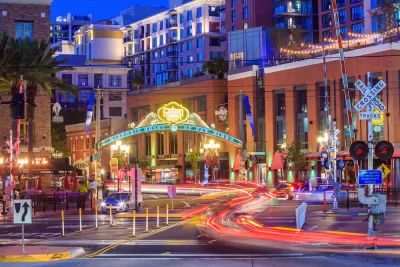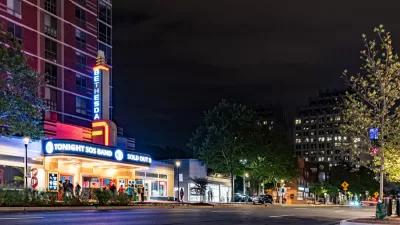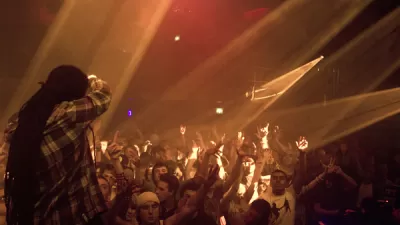Urban planners like the nightlife. They like to boogie. But one researcher argues that planners should better understand how to balance the positive and negative effects of a bustling nightlife.

Deutsche Welle runs an interview with urban scientist Jakob F. Schmid, of HafenCity University in Hamburg, who explains why planners develop a more thorough understanding of how bars and clubs operate in the wee hours of the night.
According to Schmid, his native country of Germany has done very little on the planning implications of nightlife, so "the discourse about it tends to be problem-focused and very restrictive."
"Unlike areas such as retail, local authorities and urban planners know very little about the patterns of the night economy. With our research project 'City After Eight' we want to make an impact and offer formula-based recommendations for urban planning and city marketing," says Schmid.
The article features insight into the graphic representation of the nightlife in 12 cities, as created by Schmid's research team. Schmid also notes the stronger tradition for researching the planning implications of nightlife in the United Kingdom.
FULL STORY: Why urban planners should pay attention to nightlife

Maui's Vacation Rental Debate Turns Ugly
Verbal attacks, misinformation campaigns and fistfights plague a high-stakes debate to convert thousands of vacation rentals into long-term housing.

Planetizen Federal Action Tracker
A weekly monitor of how Trump’s orders and actions are impacting planners and planning in America.

Chicago’s Ghost Rails
Just beneath the surface of the modern city lie the remnants of its expansive early 20th-century streetcar system.

Bend, Oregon Zoning Reforms Prioritize Small-Scale Housing
The city altered its zoning code to allow multi-family housing and eliminated parking mandates citywide.

Amtrak Cutting Jobs, Funding to High-Speed Rail
The agency plans to cut 10 percent of its workforce and has confirmed it will not fund new high-speed rail projects.

LA Denies Basic Services to Unhoused Residents
The city has repeatedly failed to respond to requests for trash pickup at encampment sites, and eliminated a program that provided mobile showers and toilets.
Urban Design for Planners 1: Software Tools
This six-course series explores essential urban design concepts using open source software and equips planners with the tools they need to participate fully in the urban design process.
Planning for Universal Design
Learn the tools for implementing Universal Design in planning regulations.
planning NEXT
Appalachian Highlands Housing Partners
Mpact (founded as Rail~Volution)
City of Camden Redevelopment Agency
City of Astoria
City of Portland
City of Laramie




























